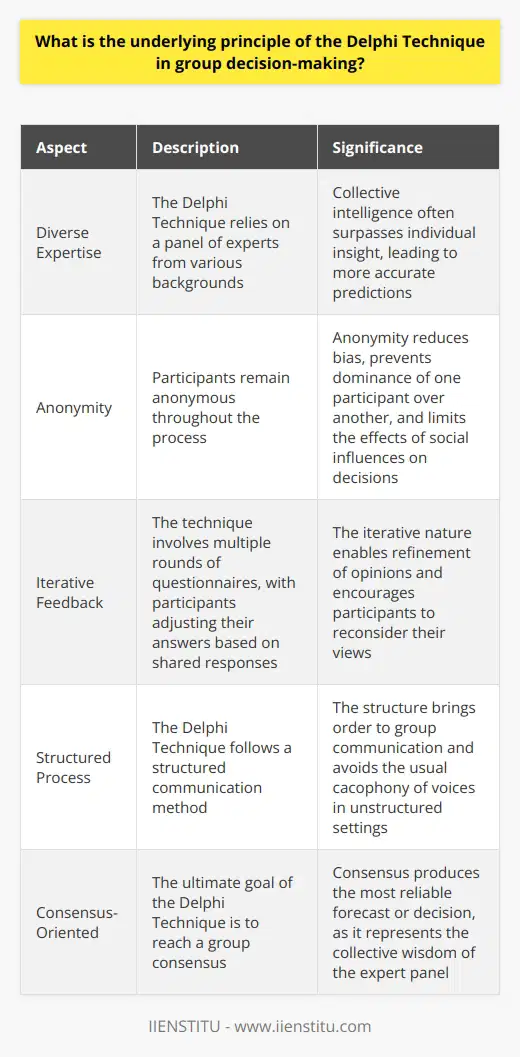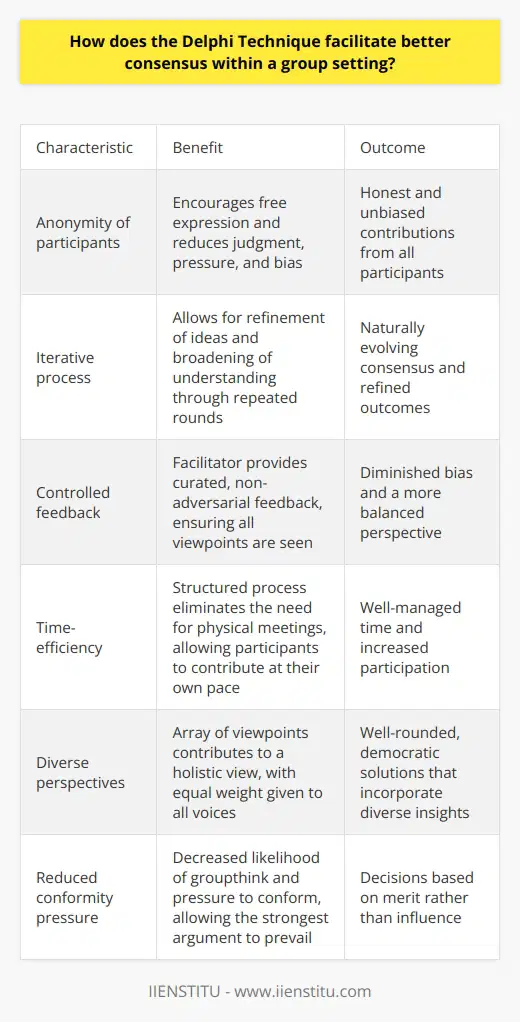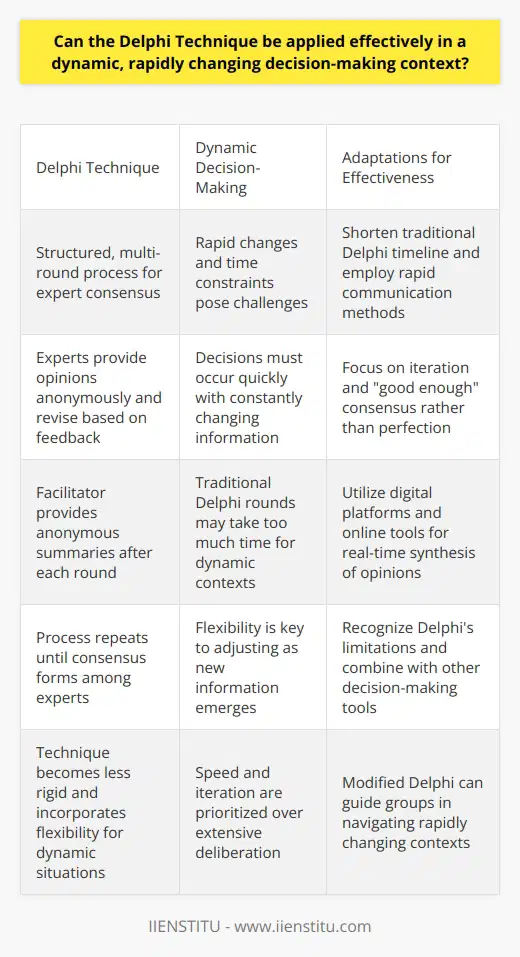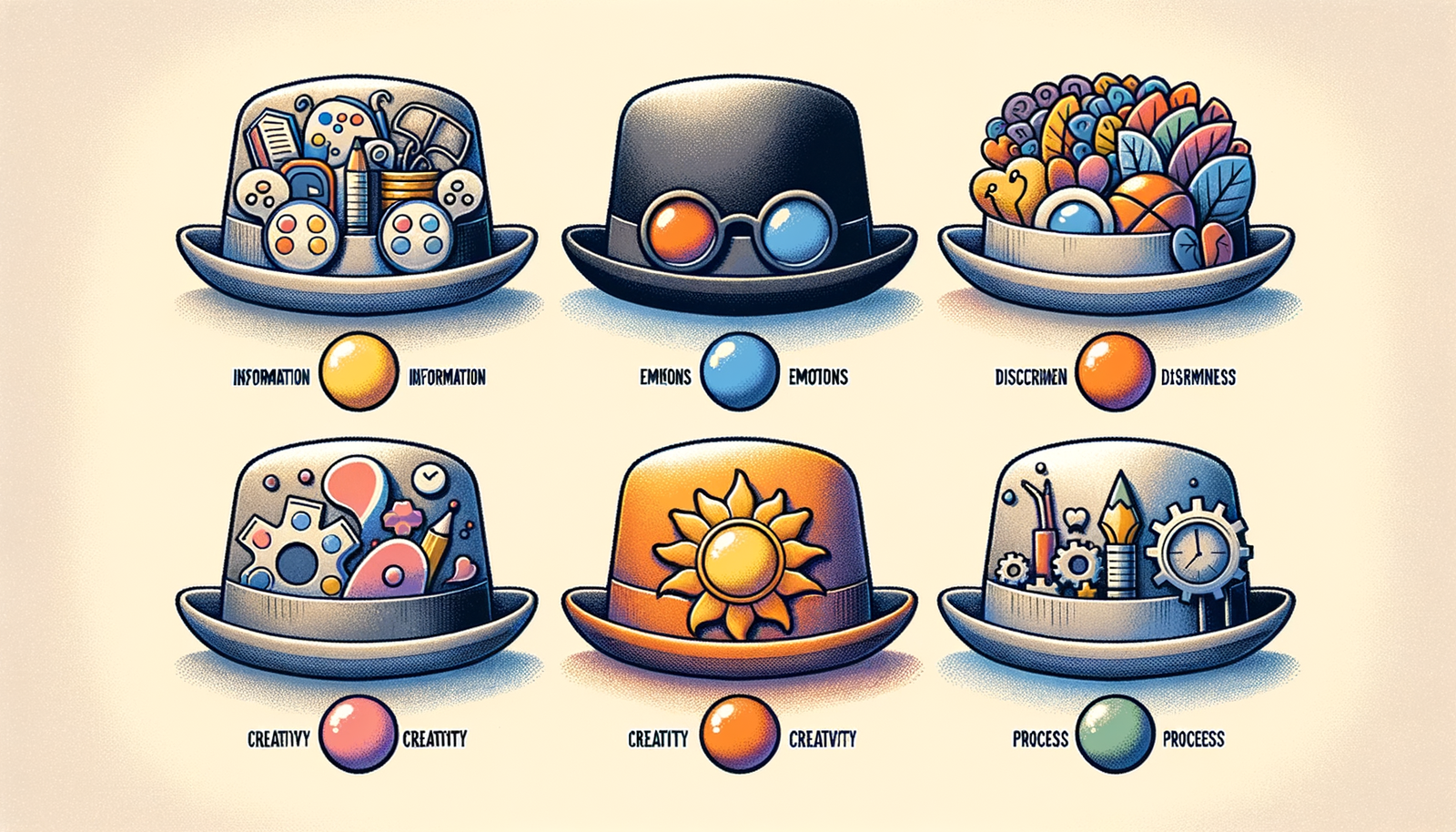
The Delphi Technique, a structured communication method, has been widely used since the mid-20th century for achieving convergence of opinion among a panel of experts. Group Decision-Making typically involves a collective of individuals striving to reach a consensus on matters of shared concern. However, amidst this synergy, various challenges such as cognitive biases, dominance of outspoken participants, and groupthink can impede the efficacy of the decision-making process.
This is where the Delphi Technique shines, mitigating such challenges through an anonymous, iterative approach that taps into expert insights while promoting equality in participation.
Explanation of the Delphi Technique
Initially developed by RAND Corporation during the Cold War, the Delphi Technique has evolved into a prominent facilitator for Decision-making Strategies in diverse fields. Serving both predictive and normative purposes, it is distinguished by a series of rounds wherein participants answer questionnaires. Feedback is aggregated and shared, allowing for individual reflection and subsequent revisions of judgments—thus catalyzing convergence. This technique is predicated on an anonymous response mechanism that seeks to reduce the impact of dominant voices and enables independent thought.
Importance of Group Decision-Making
The salience of robust Group Decision-Making methods in today's complex organizational landscapes cannot be overstated. Consensus building is the linchpin of effective decision-making, where the aim is not uniformity but an agreement that resonates with each stakeholder's perspective. It is pivotal to address the intricacies of power dynamics and access to information that commonly obstruct egalitarian decision processes. Within this context, the Delphi Technique emerges as a valuable tool, offering a pathway to overcome the impediments faced by decision-making collectives.
Thesis statement on mastering decision-making using the Delphi Technique
This article delves into the nuanced processes of the Delphi Technique, unveiling its potentials in Mastering Decision-Making. A step-by-step discourse is provided, highlighting how this method assists in cultivating a shared understanding amongst group members, ultimately leading to informed and judicious decisions. The subsequent sections will elucidate the role of group dynamics, iterative questioning, consensus formation, and integration with other decision strategies, all culminating in the mastery of group decision-making.
Understanding Group Dynamics and the Requirement for Delphi Technique
Facilitating constructive interaction within a decision-making group demands a profound comprehension of the underlying group dynamics. These dynamics influence both the process and outcome, with various individual and collective behavioral patterns playing their roles.
Group Dynamics in Decision-Making
Group dynamics are the invisible forces affecting the behavior and performance of individuals within a group. Several factors including personality traits, roles assumed by members, and preexisting relationships, significantly shape the decision-making outcomes. Recognizing and understanding these dynamics is vital; without this awareness, the decision-making process can be derailed by psychological conformity, social loafing, or centralized communication patterns that disfavor a comprehensive exploration of diverse perspectives.
Advantages of the Delphi Technique in Group Dynamics
When employing the Delphi Technique, the typical pitfalls associated with face-to-face group interactions are substantially neutralized. Anonymity plays a crucial role in equalizing participant influence, ensuring that the content of responses receives attention over the participants' identities or social statuses. This fosters an environment where decision-making is driven by information and logic rather than by interpersonal dynamics or organisational hierarchy.
Delphi Technique as a Strategy for Mastering Decision-Making
As a strategy for mastering group decision-making, the Delphi Technique offers a meticulous process that collectively harnesses expert opinion while minimizing noise and enhancing signal in the decision matrix.
Step-by-Step Procedure of the Delphi Technique
Commencing with the formation of an expert panel, the Delphi process is initiated with a first round of questionnaires that are intentionally broad to canvas a wide range of insights. This is followed by iterative rounds where the feedback is incrementally refined. The questions become honed based on previous responses, allowing experts to re-evaluate their positions and move towards a collective understanding.
Iterative Process and Consensus Building
Through successive iterations, discrepancies in viewpoints are systematically dissected, and convergence of opinions is sought. This reflection and refinement loop underscores the Delphi Technique's strengths in fostering a collaborative knowledge construction, where experts are encouraged to reassess their stances in light of group feedback, leading towards a consensus that is bolstered by critical thinking rather than conformity.
Finalizing Decisions Through the Delphi Technique
In finalizing decisions, the overall group consensus achieved through the Delphi process is interpreted and transformed into actionable outcomes. Here, the facilitator plays an instrumental role in summarizing the findings, ensuring that the collective voice is preserved in the decision-making output.
Case Studies and Examples of Delphi Technique in Action
Demonstrating Success in Various Contexts
Fortifying decision-making across various sectors, the Delphi Technique has proved its mettle. Be it in fine-tuning business strategies or sculpting public policies, this methodology has yielded impactful outcomes through comprehensive expert collaboration. One notable example in the business realm involved a multinational company employing the Delphi Technique to successfully navigate market uncertainties and develop a long-term strategic plan that aligned with emergent technological trends and customer needs.
Lessons Learned and Best Practices
Following the principles of the Delphi Technique ensures that decision-making benefits from a wealth of expertise. However, it is equally important to be mindful of potential obstacles such as participant fatigue or information overload. By implementing expert tips such as clear guidance, effective questionnaire design, and time-bound rounds, the facilitator can mitigate these issues and enable the technique to unfold its full potential.
Integrating Delphi Technique with Other Decision-making Strategies
Synergy with Other Approaches
The Delphi Technique, while powerful on its own, can be synergistically combined with other decision-making strategies. For instance, brainstorming sessions may precede a Delphi round to generate ideas, which are then refined through the Delphi's structured approach. Similarly, integrating technological tools such as decision-support systems can further enhance the analytical rigor of the Delphi method, leading to more nuanced conclusions.
When to Use the Delphi Technique
Recognizing the best scenarios for the application of the Delphi Technique is fundamental to its effective use. It is particularly beneficial when anonymity is paramount or when the decision-making task requires the distillation of insights from geographically dispersed experts. Conversely, understanding its limitations is equally important; scenarios that require prompt decision-making or involve issues of low complexity may have more befitting alternatives.
Recap of the Delphi Technique's Benefits and Process
The Delphi Technique stands out as a method not only for its procedural integrity but also for its ability to foster consensus among experts. By revisiting this technique, we reaffirm its inherent capacity to elevate group decision-making to a level where quality and inclusivity are at the forefront.
Encouragement to Adopt Delphi for Enhanced Decision Outcomes
As we embrace diverse and complex decision-making environments, the adoption of the Delphi Technique can greatly enhance the clarity and effectiveness of group decisions. It champions a balanced approach that is particularly relevant and advantageous in the information-rich, multifaceted decision contexts contemporary organizations encounter.
Advancing one's proficiency in decision-making strategies often requires guidance from seasoned professionals and targeted learning opportunities. Online resources, such as an online MBA course or a problem solving course free of charge, can be instrumental in this pursuit, offering structured learning experiences to enhance decision-making capabilities.
Frequently Asked Questions
What is the underlying principle of the Delphi Technique in group decision-making?
The Delphi Technique: An Overview
The Delphi Technique stands as a structured communication method. It relies on a panel of experts. These experts answer questionnaires in two or more rounds. After each round, a facilitator provides an anonymous summary. It includes the experts' forecasts and reasons. Participants can then adjust their answers. Thus, ongoing rounds ensue until reaching a consensus.
Guiding Principles
Diverse Expertise Enhances Predictions: A foundational principle here is that collective intelligence often surpasses individual insight. The diverse backgrounds of participants contribute to this.
Anonymity Reduces Bias: The technique maintains anonymity. This prevents the dominance of one participant over another. It also limits the effects of social influences on decisions.
Iterative Feedback Furthers Refinement: The iterative nature of the rounds enables refinement. With each round, participants reconsider their views. They use the shared responses.
Structured Process Yields Order: The structure brings order to group communication. It avoids the usual cacophony of voices in unstructured settings.
Execution of Delphi Technique
Selection of Participants Is Key: One begins with the careful selection of experts. Diversity and expertise matter here.
Questionnaires Collect Initial Data: Initial questionnaires serve to collect initial data. This kicks off the iterative process.
Anonymity Is Maintained Throughout: Participants do not know who the others are. Anonymity is maintained throughout the process. It frees individuals to express their opinions openly.
Facilitation Is Central: A neutral facilitator must guide the process. This ensures efficient and unbiased management.
Consensus Is the Goal: Ultimately, the goal is to reach a group consensus. It produces the most reliable forecast or decision.
Advantages of the Delphi Technique
Minimizes Groupthink: The process guards against groupthink. It emphasizes independent thought.
Encourages Free Expression: Anonymity leads to more open expression. It dismantles power dynamics present in face-to-face meetings.
Reduces Noise in Decision-Making: By focusing on structured responses, irrelevant and redundant discourse reduces.
Challenges in the Delphi Technique
Time-Consuming: The iterative nature makes it time-consuming. Many rounds may be necessary.
Dependent on Facilitator Skill: The quality of facilitation heavily influences outcomes. An inexperienced facilitator can derail the process.
Subject to Design Flaws: Poorly designed questionnaires can bias results. Clear and unbiased questions are critical to the process.
In conclusion, the Delphi Technique is a unique, iterative method that strategically harnesses group wisdom. It does so while minimizing the potential pitfalls of group dynamics and interactions. By ensuring anonymity, utilizing structured communication, and providing a platform for iterative feedback, this process aims to yield a well-contemplated consensus among experts.

How does the Delphi Technique facilitate better consensus within a group setting?
Understanding the Delphi Technique
The Delphi Technique stands out. It fosters group consensus. Experts communicate in rounds. They remain anonymous. This prevents dominant personalities. It curbs their influence. Anonymity levels the playing field. Every participant has equal sway. No individual biases taint decisions.
Steps in the Delphi Method
First, a facilitator defines the issue. Then, questions go to experts. They respond independently. Initial responses get summarized. Then, they're redistributed. Participants view others' opinions. They can revise their own. This cycle repeats. Gradually, consensus emerges.
Advantages of the Delphi Technique
Anonymity Encourages Free Expression
Participants speak freely. They fear no judgment. Anonymity reduces pressure. It promotes honesty.
Iteration Refines Ideas
Repeated rounds sharpen insights. Consensus evolves naturally. Discussion broadens understanding. Iteration leads to refined outcomes.
Feedback is Controlled
Feedback comes from the facilitator. It's curated, non-adversarial. Experts see all viewpoints. Bias diminishes.
Time-Efficiency
Time is well-managed. The process is structured. There's no need for physical meetings. Participants contribute at ease.
Achieving Better Consensus
Diverse Perspectives Blend
An array of viewpoints surfaces. They contribute to a holistic view. The resulting decision includes diverse insights.
Equal Weight to All Voices
No voice overshadows another. The introvert’s input holds as much weight. So does the extrovert’s. Every contribution affects the outcome.
Reduced Conformity Pressure
Groupthink becomes less likely. Pressure to conform decreases. The strongest argument prevails, not the loudest voice.
Clarity Increases with Rounds
Each round clarifies ideas. Misunderstandings lessen. Clarity cuts through the noise. Initial agreement solidifies into consensus.
Conclusion
The Delphi Technique shapes group consensus skillfully. It balances voices. It sharpens collective intelligence. People share without hesitation. Delphi fosters well-rounded, democratic solutions. It remains a valuable tool for effective decision-making.

Can the Delphi Technique be applied effectively in a dynamic, rapidly changing decision-making context?
Understanding the Delphi Technique
The Delphi Technique is a method. Experts provide their opinions anonymously. They respond to queries in multiple rounds. After each round, a facilitator provides an anonymous summary. This includes the experts' forecasts and reasons. Participating experts reconsider their previous answers. They reflect on others' responses. They may revise their initial views. This process repeats until a consensus forms.
Delphi Technique in Dynamic Contexts
Rapid Changes Pose Challenges
Dynamic environments present unique challenges. Decisions must occur quickly. Information changes constantly. Traditional Delphi rounds may take time. They require careful consideration. Can this method adapt? Yes, but it needs tweaking.
Tailoring Delphi for Speed
Speed is imperative. Shorten the traditional Delphi timeline. Employ rapid communication methods. Use online surveys. Encourage quicker turnaround. This adapts Delphi to dynamic settings.
- Implement shorter rounds
- Utilize real-time updates
- Facilitate swift feedback loops
Iteration Over Perfection
Focus on iteration. Seek 'good enough' consensus fast. Avoid perfect agreement. Time constraints matter. Flexibility becomes key. Adjust as new information emerges.
- Iterative consensus building
- 'Good enough' solutions
- Adjustments on the fly
The Role of Technology
Technology aids adaptation. Real-time Delphi uses digital tools. Participants respond simultaneously. Delphi becomes faster. It fits in dynamic contexts.
- Digital platforms streamline
- Online tools enable instant input
- Real-time synthesis of opinions
Limitations and Considerations
No technique is foolproof. The Delipi Technique may struggle. It may not match the needed pace. Other methods could complement it. Use Delphi as one input among many.
- Recognize Delphi's limitations
- Combine with other decision-making tools
- Use as one input source
Final Thoughts on Delphi's Adaptability
Delphi can fit dynamic decision-making. Adaptations are necessary. The technique becomes less rigid. It incorporates flexibility. It values speed over deliberation. Modified Delphi can guide groups. It helps them navigate rapidly changing situations.
- Delphi must adapt
- Flexibility is paramount
- Speed and iteration over deliberation
In closing, Delphi works when tailored. It proves useful with the right adjustments. It can shape effective decision-making. Even as contexts fluctuate wildly.



